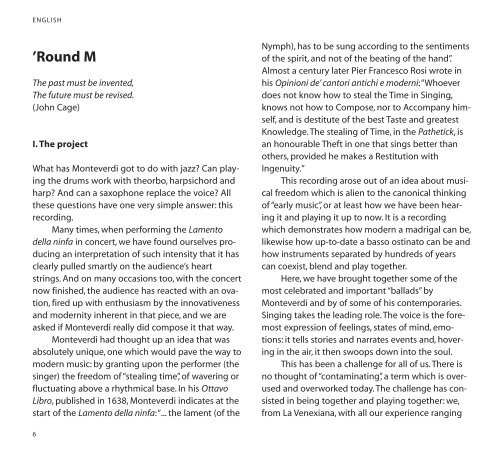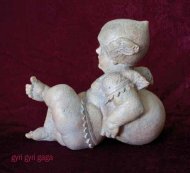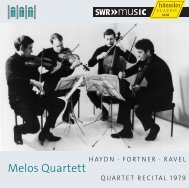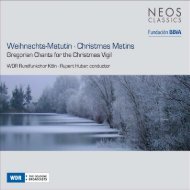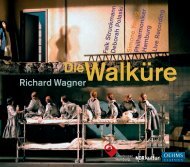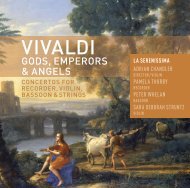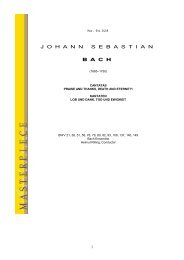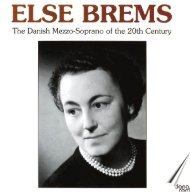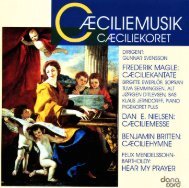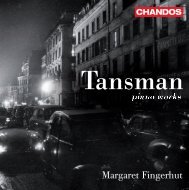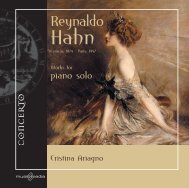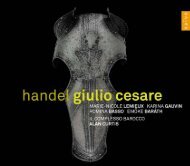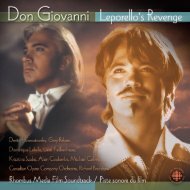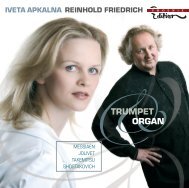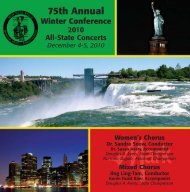GCD P30917 - Naxos Music Library
GCD P30917 - Naxos Music Library
GCD P30917 - Naxos Music Library
You also want an ePaper? Increase the reach of your titles
YUMPU automatically turns print PDFs into web optimized ePapers that Google loves.
ENGLISH<br />
’Round M<br />
The past must be invented,<br />
The future must be revised.<br />
(John Cage)<br />
I. The project<br />
What has Monteverdi got to do with jazz? Can playing<br />
the drums work with theorbo, harpsichord and<br />
harp? And can a saxophone replace the voice? All<br />
these questions have one very simple answer: this<br />
recording.<br />
Many times, when performing the Lamento<br />
della ninfa in concert, we have found ourselves producing<br />
an interpretation of such intensity that it has<br />
clearly pulled smartly on the audience’s heart<br />
strings. And on many occasions too, with the concert<br />
now finished, the audience has reacted with an ovation,<br />
fired up with enthusiasm by the innovativeness<br />
and modernity inherent in that piece, and we are<br />
asked if Monteverdi really did compose it that way.<br />
Monteverdi had thought up an idea that was<br />
absolutely unique, one which would pave the way to<br />
modern music: by granting upon the performer (the<br />
singer) the freedom of “stealing time”, of wavering or<br />
fluctuating above a rhythmical base. In his Ottavo<br />
Libro, published in 1638, Monteverdi indicates at the<br />
start of the Lamento della ninfa: “... the lament (of the<br />
6<br />
Nymph), has to be sung according to the sentiments<br />
of the spirit, and not of the beating of the hand”.<br />
Almost a century later Pier Francesco Rosi wrote in<br />
his Opinioni de’ cantori antichi e moderni: “Whoever<br />
does not know how to steal the Time in Singing,<br />
knows not how to Compose, nor to Accompany himself,<br />
and is destitute of the best Taste and greatest<br />
Knowledge. The stealing of Time, in the Pathetick, is<br />
an honourable Theft in one that sings better than<br />
others, provided he makes a Restitution with<br />
Ingenuity.”<br />
This recording arose out of an idea about musical<br />
freedom which is alien to the canonical thinking<br />
of “early music”, or at least how we have been hearing<br />
it and playing it up to now. It is a recording<br />
which demonstrates how modern a madrigal can be,<br />
likewise how up-to-date a basso ostinato can be and<br />
how instruments separated by hundreds of years<br />
can coexist, blend and play together.<br />
Here, we have brought together some of the<br />
most celebrated and important “ballads” by<br />
Monteverdi and by of some of his contemporaries.<br />
Singing takes the leading role. The voice is the foremost<br />
expression of feelings, states of mind, emotions:<br />
it tells stories and narrates events and, hovering<br />
in the air, it then swoops down into the soul.<br />
This has been a challenge for all of us. There is<br />
no thought of “contaminating”, a term which is overused<br />
and overworked today. The challenge has consisted<br />
in being together and playing together: we,<br />
from La Venexiana, with all our experience ranging


